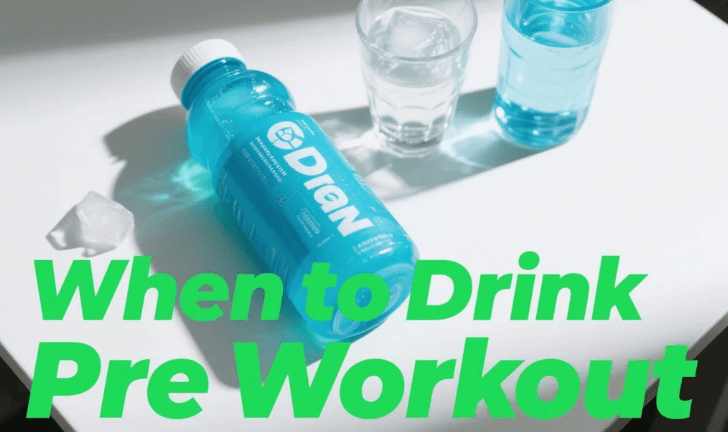When to Drink for Maximum Performance
The effectiveness of your pre-workout supplement depends significantly on when you consume it. Proper timing ensures the active ingredients reach their peak concentration in your bloodstream precisely when you need them most during your workout.
Research from the Journal of the International Society of Sports Nutrition indicates that optimal pre-workout timing can enhance performance by up to 15% compared to improper timing.
Most pre-workout formulas contain ingredients that follow distinct absorption patterns. Caffeine typically peaks in the bloodstream within 30-60 minutes after consumption, while nitric oxide boosters like citrulline malate take 45-60 minutes to reach maximum effectiveness.
Beta-alanine, known for its tingling sensation, begins working within 15-30 minutes but builds up in the system over time.
The Ideal Timeframe for Different Workouts
Strength Training Sessions:
For weightlifting and resistance training, consuming your pre-workout 30-45 minutes before beginning allows the ingredients to reach peak effectiveness as you start your heavy lifts.
This timing ensures maximum mental focus for compound movements and optimal blood flow for muscle pumps during your working sets.
High-Intensity Interval Training:
HIIT and metabolic conditioning workouts benefit from taking pre-workout 20-30 minutes beforehand. This slightly shorter window prevents the jittery feeling that can interfere with precise movement patterns while still delivering energy when you need it most during intense intervals.
Endurance Workouts:
For running, cycling, or other endurance activities, drinking your pre-workout 45-60 minutes before exercise provides a more gradual energy release. This extended timeframe helps sustain performance throughout longer sessions while avoiding the crash that can come with rapid-onset formulas.
Factors That Influence Your Ideal Timing
Several individual factors can adjust your optimal pre-workout window:
Caffeine Metabolism:
Genetic variations mean people process caffeine at different rates. Fast metabolizers may feel effects in 15-20 minutes, while slow metabolizers might need 45-60 minutes. BodyWave's personalized tracking can help identify your caffeine response pattern through heart rate and performance data.
Stomach Contents:
Taking pre-workout on an empty stomach accelerates absorption but may cause digestive discomfort. With food, absorption slows but becomes more consistent. The app's nutrition logging helps correlate your pre-workout timing with meal times for optimal results.
Supplement Composition:
Stimulant-heavy formulas generally work faster than pump-focused blends. BodyWave's supplement tracking feature helps you monitor how different formulas affect your performance at various time intervals.
Maximizing Your Pre-Workout Routine
To get the most from your pre-workout supplements:
- Start with the standard 30-minute window and adjust based on your experience
- Track your energy levels throughout workouts using BodyWave's performance metrics
- Note any digestive issues or energy crashes in the app's journal feature
- Experiment with timing variations during different workout types
- Consider splitting doses for longer training sessions
BodyWave's intelligent analysis uses your personal data to recommend the ideal pre-workout timing for your specific physiology and training style. By monitoring your heart rate response, workout performance, and recovery metrics, the app creates a customized supplement schedule that evolves with your fitness level.
Common Timing Mistakes to Avoid
Many athletes undermine their pre-workout effectiveness through these errors:
Waiting until arriving at the gym to drink it (too late for proper absorption)
Taking it immediately before warm-ups (peaks too early)
Consuming with incompatible foods or medications
Overlooking cumulative caffeine intake from other sources
Failing to account for tolerance buildup over time
BodyWave helps avoid these pitfalls by tracking your total stimulant intake and providing reminders for optimal consumption times based on your schedule.
Alternatives to Traditional Pre-Workout
For those seeking natural options with similar timing considerations:
Black coffee: 20-30 minutes before training
Green tea extract: 30-45 minute window
Beetroot juice: 45-60 minutes prior for endurance
Carbohydrate gels: 15-20 minutes before intense sessions
The app's nutrition database includes these natural alternatives alongside commercial supplements for comprehensive tracking.
Conclusion: Personalizing Your Pre-Workout Strategy
The science clearly shows that pre-workout timing significantly impacts its effectiveness, with 30-45 minutes before training being the sweet spot for most users. However, individual factors like caffeine sensitivity, workout type, and supplement composition all influence your ideal window.
By using BodyWave to track your supplement timing alongside workout performance, you can dial in the perfect pre-workout routine tailored to your unique physiology. The app's intelligent analysis removes the guesswork, helping you achieve consistent energy and focus for every training session.
Ready to optimize your pre-workout timing? Download BodyWave today and take the guesswork out of your supplement routine. With personalized recommendations based on your actual performance data, you'll never wonder about the right time to fuel your workouts again.







BodyWave: Invest in Your Well-being!

